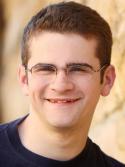

Tim Clark ’12
Major: Classics
Thesis Advisor: Christopher van den Berg
What’s the topic of your thesis?
It’s a topic that combines a lot of the different elements of the Classics discipline. At its core, it’s an analysis of a speech that Cicero, the great Roman orator of the first century B.C. in the Republic, gave. The speech is called de domo sua, “concerning his house,” and he gave it in 57 BC. The lead-up to why he’s talking about his house is complicated, but the basis of the story is: Cicero goes into exile in 58 BC, the previous year, because of all kinds of complicated political and personal deals that go back several years. His main enemy, who helps bring about his exile, Publius Clodius Pulcher, after Cicero leaves Rome, in sort of celebration of this, has Cicero’s house torn down and on its place, a temple built. So de domo sua is Cicero’s speech to the college of pontiffs, the main religious body in Rome, saying Clodius was acting illegally, and, contrary to the precepts of religion, that [their] ancestors founded in establishing the temple and destroying [his] house. My thesis is trying to see what we can learn by assessing several aspects of the speech that I think have not been covered a lot in the already scant scholarship on this speech. One of the reasons why I’m really excited about the project is that a lot of people haven’t looked at or analyzed the speech in detail.
It’s one of his more obscure speeches?
Yes, very much so. If you look at a bibliography of Cicero, you’ll find for a set of speeches called the Catilinarians, books, and for this one, a single commentary and a couple scant articles that start talking about it, and then go on tangents about other things. What’s interesting about this speech is that it occurs in a really difficult and unique period for Cicero, because before he goes into exile, he’s really only concerned with placating his political allies [in] the main body of Rome, the Senate. He’s really only concerned with making sure they’re happy with what he’s doing. But the way he comes back from exile is, he gets support not just from the Senate, but from the Triumvirate, the great body of three leading Roman citizens, Gaius Caesar, Genaeus Pompey and Crassus. They were really instrumental, particularly Pompey, in bringing him back from exile. So Cicero is sort of caught between trying to maintain his relationship with the Senate and at the same time trying to maintain his relationship with the Triumvirate, because he owes them big, and trying to make sure he does that without pissing either group off, because for the past two or three years, in particular, the Senate and the Triumvirate have been at odds. The core of my thesis is, how is Cicero dealing with this complicated political position? And what does the way in which he’s constructed his speech, particularly in how he is using references to Roman landmarks, different things in the Forum, temples, Roman houses, the structure of Roman houses and their significance, do to thread this needle and balance things out?
How did you decide on this topic?
It sort of came about organically, I guess. I talked with my thesis advisor, Professor van den Berg, at the end of last year about possible topics, and we talked about different things, and eventually I had this idea, [that] I’d like to maybe do something about Cicero and arts or something, because I was really interested in doing a topic that combined the study of Latin with the study of archaeology and art history. And Professor van den Berg was like, no, there really isn’t much there, and it might be more helpful to do something about Cicero and religion, because religion is so vital to the study of Roman history and the study of the politics of the late Republic. So he suggested this speech as one possible way to go about it, and I read it, and actually found a lot of instances where Cicero is drawing on religion, but he’s also drawing on buildings and architecture and the significance of Roman houses and stuff that did the same thing that I was already looking for. So I read the speech in English over the summer, did a lot of research, some sort of background to Roman houses and Roman religion, the topography of the forum, that kind of thing. As I researched more, I realized there that was this hole in the scholarship.
What advice would you have for other students considering writing theses?
As I’m sure a lot of [other] seniors would say as well, pick a topic that you really really like because first semester, I’m like, “Oh, I’m working on my thesis, but I don’t really have any deadlines,” and now it’s sort of like, “Alright, March 16th the first draft is due.” And I have a hundred pages to write in the next bit. So do something you really love, and something you think will be interesting, and fill that gap in the scholarship. Try to start it as early as possible, as well. That was a big advice that Professor van den Berg gave me, and I was lucky in that my summer program that I did was a tour of all of Greece, but it was conducted at the American School of Classical Studies in Athens, which is quite possibly the largest and most extensive library for ancient history in the world, so I was able to pick and choose. But even if you don’t have that, go to your local library or do some research online, just try to get a really good idea of what your project is, so that when you get to campus in September, you can just start right in.